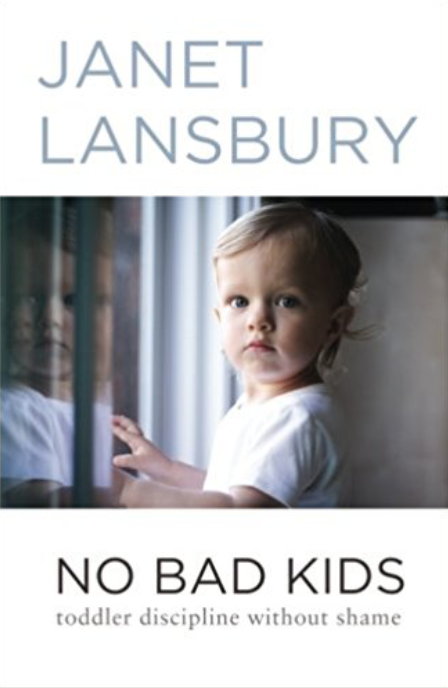We are part of Amazon Affiliates.
 I cannot stop talking about the book No Bad Kids: Toddler Discipline Without Shame, by Janet Lansbury. Chances are if you’ve overheard me chatting with other toddler moms at the playground lately, it’s been about this book. A friend recommended No Bad Kids to me at the perfect time. My son was a little over a year old, and it felt like a switch had flipped. All of a sudden we were having battles over small things, like getting into the stroller, that never were an issue before.
I cannot stop talking about the book No Bad Kids: Toddler Discipline Without Shame, by Janet Lansbury. Chances are if you’ve overheard me chatting with other toddler moms at the playground lately, it’s been about this book. A friend recommended No Bad Kids to me at the perfect time. My son was a little over a year old, and it felt like a switch had flipped. All of a sudden we were having battles over small things, like getting into the stroller, that never were an issue before.
I texted my husband one afternoon “I don’t know if I can do this anymore,” because I was at a complete loss for how to handle my son’s new willfulness and frequent meltdowns. I could see that my little guy wanted to be more independent, but wasn’t always able to safely execute the grand plans in his head. This was leading to a lot of frustration, for everyone involved. I quickly realized that I was no longer taking care of a baby, but parenting a toddler, and needed some guidance to help our family transition more smoothly to this new phase of life.
This book was a quick and easy read and gave me new tools to add to my parenting toolbox when I needed them the most. The author, Janet Lansbury, provides simple, no-nonsense advice about ways to communicate and interact with toddlers more effectively and respectfully. She provides insight into what toddlers are going through developmentally, and how that affects their behavior. I’ve been telling all the toddler moms I know about this book, so I thought I’d share a few of my favorite quotes and tips with you too!
Don’t Just Say No
In the early stages of the toddler transition, I caught myself saying no constantly, and wanted to learn a more effective way to address my son’s behavior. Lansbury advises: “Don’t ‘just say no’…replace it with simple guidance and a brief explanation,” (p.28). For example, instead of saying “no touching the stove” I’ve tried “I won’t let you touch the stove, it could burn you. I’m going to move you to a safer spot.” This subtle shift in language has made a huge difference at our house, because it is clearer and less repetitive than saying “no, no, no.” It took practice to shift my thinking and responses in the moment, but it slowly started to feel more natural.
Handling Hitting
What about hitting? Lansbury encourages parents to block the hit if possible and say “I won’t let you hit” or right after your child hits to say “I don’t want you to hit,” (p.32). She explains that it’s important for parents to clearly and calmly address the behavior, but to avoid making too big a deal of it. If parents get too upset or give the behavior too much attention, children might be tempted to try it again to see what kind of reaction they’ll receive. My son doesn’t hit very often, but it definitely happens. It still shocks me when I see him push another kid on the playground, or grab someone else’s toys out of their hand. I’m learning not to take it personally (What have I done wrong?! My sweet baby has become a monster!) and to react calmly, but firmly. It’s a work in progress!
Our Needs Matter, Too
Toddlers need our attention, guidance, and love, but they also need to learn our boundaries. It’s easy for me to fall into a pattern of giving, giving, giving to my son, forgetting to meet my own needs, and then feeling depleted at the end of the day. I love Janet Lansbury’s reminder that “Our needs matter, too…Just as we are learning about our children, they need to know us– our likes and dislikes, our pet peeves, our limits,” (p.26). I have been practicing setting small boundaries that are important to me, like finishing my cup of tea in the morning before playing trains or reading books. My son doesn’t always like it (we sometimes compromise and I drink my tea sitting right next to him while he plays), but he is slowly learning that I have needs too and that as soon as they’re met I can give him my full attention and participation.
Addressing the Whining
On how to deal with whining: Lansbury recommends addressing the whining with “gentle guidance” (p.75). This could sound like, “It sounds like you’re uncomfortable, but it’s hard for me to understand you. Please tell me in your normal voice,” or “That sound hurts my ears,” (p.75). My inclination before reading this book was to ignore the whining, but I realize now that that won’t make it stop or help teach my son a better way to communicate his needs. I like that this book has changed my perspective about whining and other (irritating) toddler behavior.
No Bad Kids provides simple approaches, and even specific phrases, to address common behaviors without encouraging or giving into them, which has been so helpful! It helped me understand how to be respectful, but firm and consistent, which can be a hard balance to strike. There is so much other valuable advice in this book, I cannot recommend it enough! If you have a toddler at home, you need this book on your nightstand. If you’ve already read this book, or have another favorite about toddler discipline, I’d love to hear about it!
[hr]
Join us for next month’s book club selection, Unconditional Parenting, that we’ll review on April 23!
[xyz-ihs snippet=”No-Bad-Kids-book”][xyz-ihs snippet=”unconditional-parenting-book”]















